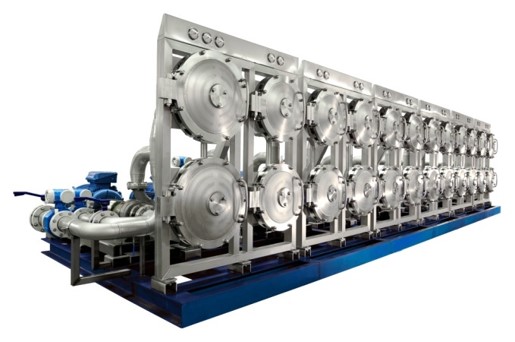Hydrocyclone on:
[Wikipedia]
[Google]
[Amazon]
 Hydrocyclones are a type of cyclonic separators that separate product phases mainly on basis of differences in gravity with aqueous solutions as the primary feed fluid.
As opposed to dry or dust cyclones, which separate solids from gasses, hydrocyclones separate solids or different phase fluids from the bulk fluid. A hydrocyclone comprises a cylindrical shaped feed part with tangential feed; an overflow part with vortex finder; a conical part with an apex. A cyclone has no moving parts.
Hydrocyclones are a type of cyclonic separators that separate product phases mainly on basis of differences in gravity with aqueous solutions as the primary feed fluid.
As opposed to dry or dust cyclones, which separate solids from gasses, hydrocyclones separate solids or different phase fluids from the bulk fluid. A hydrocyclone comprises a cylindrical shaped feed part with tangential feed; an overflow part with vortex finder; a conical part with an apex. A cyclone has no moving parts.
 The main areas of application for hydrocyclones are:
*Mineral processing industry Hydrocyclones are frequently utilized in the metallurgical and mineral processing industry for the classification of fine particles and dewatering of slurries.
*
The main areas of application for hydrocyclones are:
*Mineral processing industry Hydrocyclones are frequently utilized in the metallurgical and mineral processing industry for the classification of fine particles and dewatering of slurries.
* Filters
Solid-gas separation
Waste treatment technology
Filters
Solid-gas separation
Waste treatment technology
 Hydrocyclones are a type of cyclonic separators that separate product phases mainly on basis of differences in gravity with aqueous solutions as the primary feed fluid.
As opposed to dry or dust cyclones, which separate solids from gasses, hydrocyclones separate solids or different phase fluids from the bulk fluid. A hydrocyclone comprises a cylindrical shaped feed part with tangential feed; an overflow part with vortex finder; a conical part with an apex. A cyclone has no moving parts.
Hydrocyclones are a type of cyclonic separators that separate product phases mainly on basis of differences in gravity with aqueous solutions as the primary feed fluid.
As opposed to dry or dust cyclones, which separate solids from gasses, hydrocyclones separate solids or different phase fluids from the bulk fluid. A hydrocyclone comprises a cylindrical shaped feed part with tangential feed; an overflow part with vortex finder; a conical part with an apex. A cyclone has no moving parts.
Working principle
Product is fed into the hydrocyclone tangentially under a certain pressure. This creates a centrifugal movement, pushing the heavier phase outward and downward alongside the wall of the conical part. The decreasing diameter in the conical part increases the speed and so enhances the separation. Finally, the concentrated solids are discharged through the apex. The vortex finder in the overflow part creates a fast rotating upward spiral movement of the fluid in the centre of the conically shaped housing. The fluid is discharged through the overflow outlet.Cyclone parameters
The following parameters are decisive for good cyclone operation: *the design *the specific weight difference between the two product phases *the shape of the solids *the speed of the feed *the density of the medium *the counter pressure at the overflow and apexAreas of application
 The main areas of application for hydrocyclones are:
*Mineral processing industry Hydrocyclones are frequently utilized in the metallurgical and mineral processing industry for the classification of fine particles and dewatering of slurries.
*
The main areas of application for hydrocyclones are:
*Mineral processing industry Hydrocyclones are frequently utilized in the metallurgical and mineral processing industry for the classification of fine particles and dewatering of slurries.
*Starch
Starch or amylum is a polymeric carbohydrate consisting of numerous glucose units joined by glycosidic bonds. This polysaccharide is produced by most green plants for energy storage. Worldwide, it is the most common carbohydrate in human diets ...
industry Hydrocyclones are commonplace in the potato starch
Potato starch is starch extracted from potatoes. The cells of the root tubers of the potato plant contain leucoplasts (starch grains). To extract the starch, the potatoes are crushed, and the starch grains are released from the destroyed cells. T ...
, cassava starch, wheat starch and corn starch
Corn starch, maize starch, or cornflour (British English) is the starch derived from corn (maize) grain. The starch is obtained from the endosperm of the kernel. Corn starch is a common food ingredient, often used to thicken sauces or soup ...
industry for the concentration and refining of starch slurries.
*The potato processing industry Hydrocyclones are used for the separation of starch from cutting water in the french fries
French fries ( North American English), chips ( British English), finger chips (Indian English), french-fried potatoes, or simply fries, are '' batonnet'' or '' allumette''-cut deep-fried potatoes of disputed origin from Belgium and France ...
and potato crisp and potato flakes industry
*Sand separation and classification Hydrocyclones used for sand separation
Sand is a granular material composed of finely divided mineral particles. Sand has various compositions but is defined by its grain size. Sand grains are smaller than gravel and coarser than silt. Sand can also refer to a textural class o ...
and classification and as a separator of sand from water or sludge
*Oil-water separation: Separation of oil and water in a.o. the offshore industry
 Filters
Solid-gas separation
Waste treatment technology
Filters
Solid-gas separation
Waste treatment technology